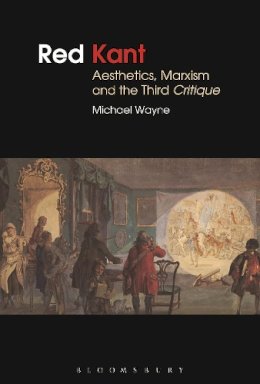
Red Kant: Aesthetics, Marxism and the Third Critique
Michael Wayne
Is Kant really the ‘bourgeois’ philosopher that his advocates and opponents take him to be?
In this bold and original re-thinking of Kant, Michael Wayne argues that with his aesthetic turn in the Third Critique, Kant broke significantly from the problematic philosophical structure of the Critique of Pure Reason. Through his philosophy of the aesthetic Kant begins to circumnavigate the dualities in his thought. In so doing he shows us today how the aesthetic is a powerful means for imagining our way past the apparent universality of contemporary capitalism.
Here is an unfamiliar Kant: his concepts of beauty and the sublime are reinterpreted as attempts to socialise the aesthetic while Wayne reconstructs the usually hidden genealogy between Kant and important Marxist concepts such as totality, dialectics, mediation and even production. In materialising Kant’s philosophy, this book simultaneously offers a Marxist defence of creativity and imagination grounded in our power to think metaphorically and in Kant’s concept of reflective judgment. Wayne also critiques aspects of Marxist cultural theory that have not accorded the aesthetic the relative autonomy and specificity which it is due.
Discussing such thinkers as Adorno, Bourdieu, Colletti, Eagleton, Lukács, Ranciére and others, Red Kant: Aesthetics, Marxism and the Third Critique presents a new reading of Kant's Third Critique that challenges Marxist and mainstream assessments of Kant alike.
Product Details
About Michael Wayne
Reviews for Red Kant: Aesthetics, Marxism and the Third Critique
Bryan Smyth, University of Mississippi
Philosophy in Review
Red Kant: Aesthetics, Marxism, and the Third Critique is impressively ambitious: it aims to synthesize two notoriously difficult and revolutionary philosophers in order to reveal a causal connection between the third Critique and Marxist social theory. ... [Wayne's] writing is unpretentious, accessible, and jargon-free; he covers difficult terrain lightly and quickly; and he raises many questions that later scholars may feel compelled to answer (or, at least, to investigate).
British Journal of Aesthetics
Red Kant attempts nothing less than a reclaiming of the aesthetic for the cause of emancipatory social transformation ... [Wayne] situates his case within Kant's formidable philosophical system and draws consequential links to Marx ... Its success in this endeavour rests largely on Wayne's rare ability to distinguish philosophical explication from his own powerful reinterpretations.
Film-Philosophy
Red Kant: Aesthetics, Marxism, and the Third Critique, offers a cogent and valiant defense of the necessity for sophisticated thinking about aesthetics in our contemporary moment … a valuable resource on the relationship between Kant’s philosophy and Marxist critical theory. Red Kant reaffirms the radical political power of the aesthetic; and Wayne’s reading of Kant goes a long way towards repairing this 'bourgeois' and 'idealist' philosopher’s reputation. Such a project has been, I think, long overdue.
Bakary Diaby
Sequiter
No longer just an archetypal bourgeois philosopher, Kant emerges from Wayne’s new book as a thinker whose system led him to grasp the stultifying limits of positivist reason. Wayne provides incisive critiques not just of bourgeois presentations of Kant but also of earlier left readings of his aesthetic by Bourdieu, Deleuze, Eagleton, Rancière and others; he demonstrates the contemporaneity of the Kantian model through sparkling analyses of films, ranging from Casablanca to Land of the Dead. A compelling demonstration of the continuing resourcefulness of rational critique for progressive cultural politics today.
Andrew Hemingway, Emeritus Professor of History of Art, University College London, UK Michael Wayne does more than just read Kant’s Critique of Judgment against the grain he manages to deliver us a truly radical Kantian agency that neither mainstream scholars nor dominant Marxist interpreters have dared to consider. Red Kant anticipates techniques of aesthetic estrangement found in Brecht, Benjamin and certain forms of science fiction. Red Kant rescues aesthetic populism for Marxist critics who have too long abandoned research into working class fantasy and imagination to anthropology, cultural studies and corporate marketers. Red Kant reassigns concepts such as beauty and the sublime to the social-historical realm, reinvigorating material production with a utopian inflection made possible by the metaphorical workings of the aesthetic. Red Kant rocks.
Gregory Sholette, Assistant Professor Queens College, CUNY, USA, and an Associate of the Art, Design and the Public Domain program at the Graduate School of Design, Harvard University, USA In this bold and original re-thinking of Kant, Michael Wayne argues that with his aesthetic turn in the Third Critique, Kant broke significantly from the problematic philosophical structure of the Critique of Pure Reason. Through his philosophy of the aesthetic Kant begins to circumnavigate the dualities in his thought. In so doing he shows us today how the aesthetic is a powerful means for imagining our way past the apparent universality of contemporary capitalism.
Eugene Wolters
Critical-Theory blog
Wayne does more than simply make a familiar plea for the role of the aesthetic as socially transformative; he situates his case within Kant’s formidable philosophical system and draws consequential links to Marx, all the while deflecting, through helpful explication, the views of his ‘bourgeois’ interlocutors.
Film-Philosophy Journal
